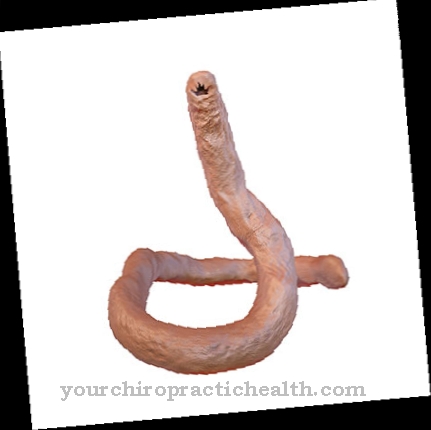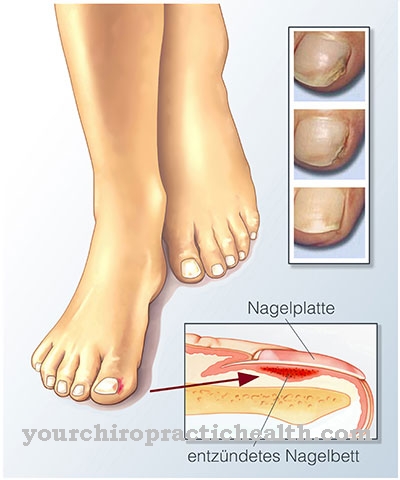The Cushing Syndrome or the Hypercortisolism is a condition caused by high levels of cortisol in the body. It is associated with various clearly visible changes in appearance and with body dysfunction. Cushing's syndrome needs treatment as it progresses and becomes life threatening without therapy.
What is Cushing's Syndrome?
.jpg)
© bilderzwerg - stock.adobe.com
Cushing's syndrome is a condition in which an increase in cortisol levels causes several different symptoms. Cortisol is a hormone that is made in the adrenal cortex. A distinction is made between endogenous (originating from the body) and exogenous (externally caused) Cushing's syndrome.
In endogenous Cushing's syndrome, the adrenal cortex produces more cortisol than the body needs due to pathological changes. The exogenous Cushing's syndrome is caused externally when the body is given glucocorticoids (cortisone) or ACTH as part of a therapy over a longer period of time. ACTH is a hormone that stimulates the adrenal cortex to produce more cortisol.
If there is a permanent excess of cortisol in the body, the typical symptoms of Cushing's syndrome with changes in appearance and various functional disorders occur. Cushing's syndrome is a rare disease, with only 3-4 cases per 100,000 people per year.
causes
The cause of Cushing's syndrome is always an excess of the hormone cortisol. In the case of exogenous Cushing's syndrome, the administration of drugs is responsible, which are administered over a longer period of time as part of a therapy.
These are medicines containing cortisol, which are taken, for example, for chronic inflammation, after transplants or for autoimmune diseases. If the medication is discontinued after successful treatment, the symptoms usually subside.
Endogenous Cushing's Syndrome is caused by an overproduction of the hormone cortisol in the body. There are, in turn, various reasons for this increased release of cortisol. A common cause of endogenous Cushing's syndrome is a tumor on the pituitary gland. Some types of lung cancer and adrenal tumors can also be triggers.
You can find your medication here
➔ Medicines for weight loss & dietSymptoms, ailments & signs
The first symptom of Cushing's syndrome is often a change in the distribution of fat on the body: fat is increasingly being deposited on the face ("full moon face"), the neck thickens ("buffalo neck"), and the waist circumference increases. Arms and legs are only slightly muscled and appear very thin compared to the trunk. With increased fat storage, the body weight increases, the muscle mass and thus the muscle strength decrease.
The increased release of cortisol can affect bone density, the bones become brittle and break more easily. This often causes bone and back pain. It is not uncommon for diabetes mellitus to develop due to hypercortisolism: Signs of this are great thirst and increased urination. Headaches and high blood pressure are also common in Cushing's syndrome.
Externally, the disease manifests itself in many cases as acne, wound healing disorders, the increased occurrence of bruises and a lot of body hair in women. The skin becomes thinner and red streaks can form on the abdomen, hips and armpits, which resemble stretch marks during pregnancy.
Menstrual cycle disorders develop in women, and menstruation can also stop altogether. Men often suffer from erectile dysfunction, children often show stunted growth with simultaneous obesity. In many cases, depression, anxiety attacks, strong mood swings and an increased susceptibility to infections accompany the disease.
Diagnosis & course
The symptoms of Cushing's syndrome are very diverse. A diagnosis is often only made after years, as the symptoms develop only gradually and are not immediately recognizable.
Weight gain, high blood pressure and symptoms similar to those found in diabetes, i.e. increased thirst and frequent urination, are typical. Over time, the body changes in appearance.The face becomes rounder and is usually reddened, fat accumulates in the neck and the so-called buffalo or bull neck develops.
Muscle strength decreases and back pain occurs. Men often have problems with potency, women have no menstruation and there is increased body hair. Kidney stones, osteoporosis, and heart failure can occur. Psychological changes are also possible. Some people have anxiety attacks, depression, or mood swings.
The diagnosis of Cushing's syndrome can only be made with certainty through various laboratory tests. As a rule, saliva, blood and urine are examined with special laboratory tests. Imaging methods such as sonography (ultrasound), computed tomography (slice images) and scintigraphy (images with contrast media) are also used. If Cushing's syndrome is not treated, it can lead to a life-threatening condition in the long term.
When should you go to the doctor?
Most of the time, the symptoms of Cushing's syndrome appear as side effects during cortisone therapy. This is the exogenous form of the disease that is brought about from the outside. It becomes a matter of concern if the symptoms go beyond the extent announced by the attending physician.
In the event of an overdose, the doctor will slowly reduce the dose. The cause of the increased symptoms could also come from an additional medication that the patient is taking without the doctor's knowledge. In order to avoid incompatibilities, the information on medicinal products in the anamnesis must be complete.
If a until then healthy person develops typical Cushing symptoms, a visit to the doctor is inevitable. If Cushing is suspected, the family doctor will refer you to a specialist in endocrinology. Using tests, imaging, and physical exams, the doctor will diagnose the trigger for the symptoms. If the cause is a tumor that leads to increased cortisol production, the endocrinologist will advise surgery and then initiate appropriate therapy.
Untreated Cushing's syndrome can be life-threatening. Important body systems are imbalanced in this disease. Without therapy, there is a risk of stroke or heart attack. Therefore, a visit to the doctor should not be postponed. With timely treatment, the prognosis is positive in most cases.
Doctors & therapists in your area
Treatment & Therapy
Treatment for Cushing's syndrome depends on the cause. The aim is always to normalize the increased cortisol level so that the physical changes caused can regress. In exogenous Cushing's syndrome, the triggering drugs are discontinued step by step or, if they are therapeutically necessary, at least reduced.
In endogenous Cushing's syndrome, the cause of the overproduction of cortisol must be eliminated. Surgery is often necessary to remove the tumor that caused it, and radiation is sometimes used. If there is a tumor directly on the adrenal gland, it may also be necessary to remove one or both adrenal glands. After such an operation, the patient has to take hormones for life (hormone substitution).
If an operation is not possible for certain reasons, drugs that inhibit the formation of cortisol can help. Sometimes these herbs are also given in the preparation phase before an operation. After treatment for Cushing's syndrome, the cortisol level must be checked regularly over a long period of time.
Outlook & forecast
The course of Cushing's syndrome depends on the cause and the time at which treatment is started. If the syndrome is triggered by the administration of medication with a high cortisol content, symptoms are immediately relieved when the medication is discontinued. After a few weeks, Cushing's syndrome is considered cured, as the excess cortisol has been removed from the body and excreted. It is a side effect of drugs that were administered as part of long-term therapy.
If the disease is caused by a carcinoma, recovery depends on the location of the tumor formation, the time of diagnosis and the start of treatment. If the cancer is detected early, the chances of success for a cure are good. If an existing tumor has already spread further in the organism, the chances of recovery decrease. The prospects for bronchial carcinoma are very poor. On the other hand, kidney carcinoma can lead to a cure if removed in time.
In the case of a benign ulcer in the area of the pituitary gland, the chances of healing for Cushing's syndrome are to be classified as good. The activity of the pituitary gland is severely restricted by the ulcer. If the tumor is recognized in time, it can be treated and removed. As a result, the pituitary gland resumes its natural function and the patient experiences healing.
You can find your medication here
➔ Medicines for weight loss & dietprevention
One can only prevent the exogenous Cushing's syndrome. During therapy with cortisol-containing medication, if the cortisol level is regularly checked, an increase can be detected immediately and action can be taken in good time. Prevention against endogenous Cushing's syndrome is not possible.
Aftercare
Some measures and options for follow-up care are available to those affected with hypercortisolism, whereby these usually depend very much on the exact cause of the disease, so that general predictions can be made. However, the disease must be recognized very early to prevent fatal complications or further worsening of the symptoms.
With hypercortisolism, the person affected should therefore consult a doctor at the first symptoms and signs and treat the disease. If the hypercortisolism is caused by medication, these must be discontinued. However, medical supervision should always take place.
In the event of interactions or if anything is unclear, a doctor should always be contacted first. In some cases, surgical interventions are also necessary to alleviate the symptoms of hypercortisolism. After such an operation, the person concerned should definitely rest and take care of his body.
Exertion and other physical or stressful activities should be avoided. When taking hormones, ensure that the dosage is correct and that they are taken regularly. It cannot be universally predicted whether this disease will lead to a reduced life expectancy.
You can do that yourself
The possibility of helping people to help themselves is not possible with Cushing's syndrome with a direct effect on the course of the disease. The focus of everyday support for yourself should therefore be mental and emotional well-being.
Life with the disease should be adapted and optimized to the given possibilities. A healthy lifestyle, a balanced diet and a stable social environment are beneficial. Getting help from people close by should be free of inhibitions, without asking too much from others.
Therapeutic support is helpful for psychological problems. In addition, behavioral strategies can be developed that can be used especially when dealing with challenging situations. Exchanging ideas with people who have the same diagnosis can also be beneficial. This can bring relief with mutual tips and advice on how to better deal with the disease.
A good and secure self-confidence is very helpful in everyday life, especially in contact with the public. In order to be prepared for the developments of the disease, a comprehensive exchange of information should take place between the doctor and the patient. Alternatively, a lack of knowledge can be acquired through studies or specialist literature. This helps to avoid surprises and to be prepared for unpleasant situations.




.jpg)

.jpg)

















.jpg)



